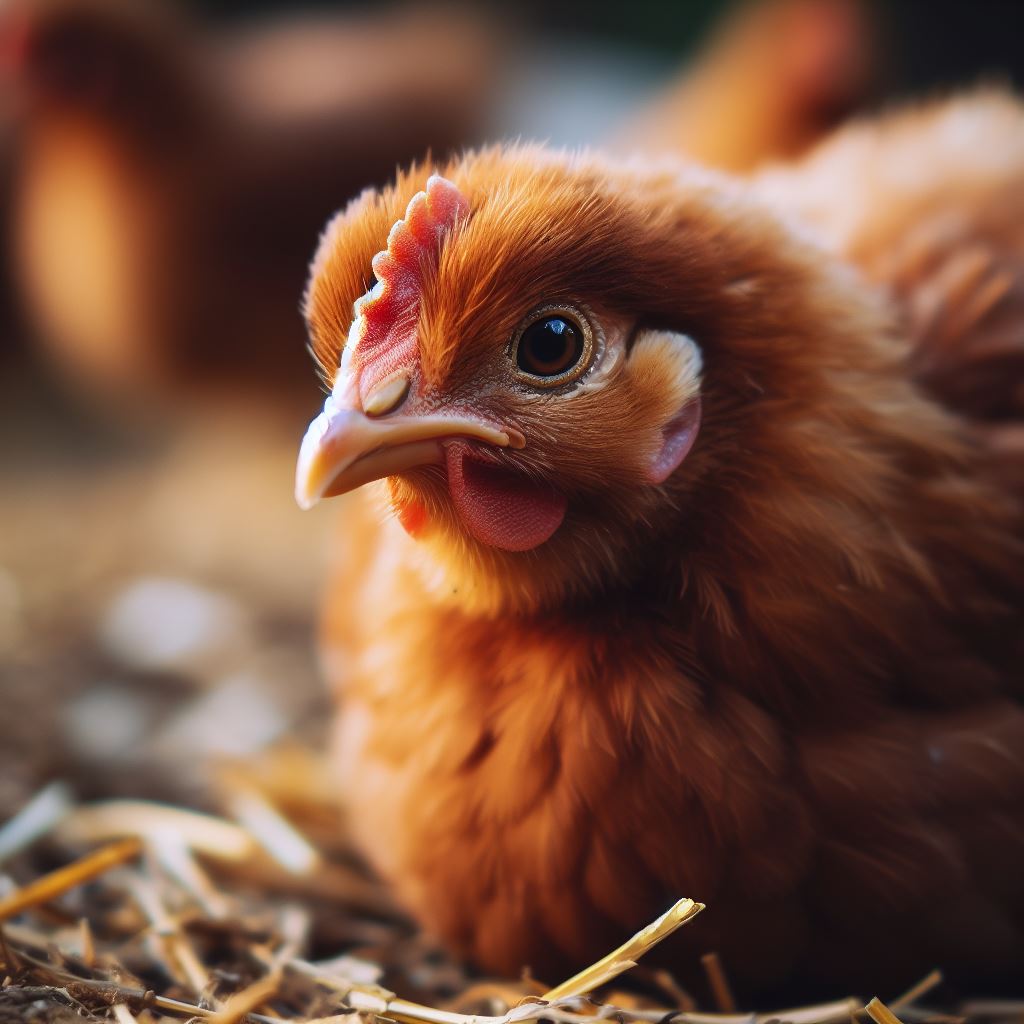Can Chickens Eat Seaweed? Discover the Benefits and Risks
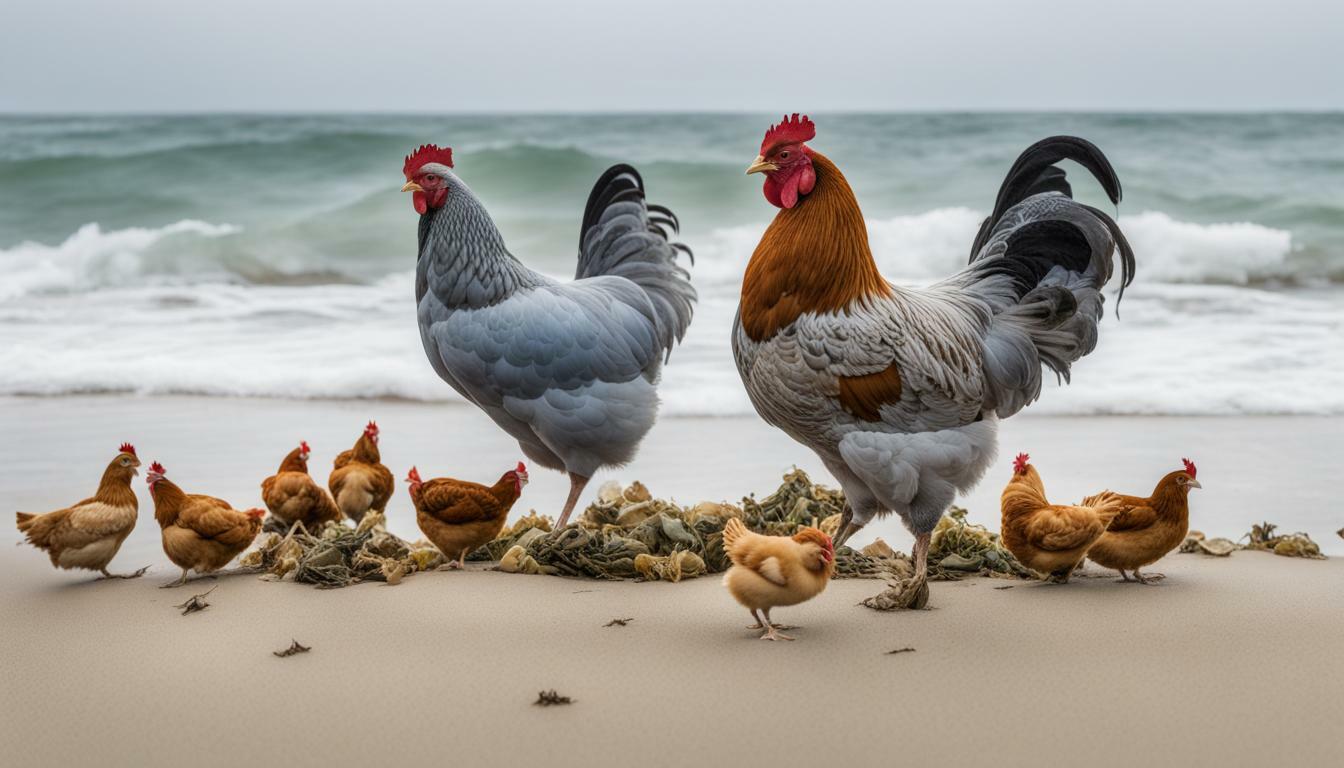
Table of content:
Can chickens eat seaweed? Seaweed offers many nutritional benefits for chickens and can be a healthy supplement to their diet in moderation. However, there are some potential risks to be aware of when feeding chickens seaweed. This comprehensive guide covers everything you need to know about feeding seaweed to chickens.
Key Takeaways:
- Seaweed is high in protein, fiber, vitamins, minerals and carotenoids that are beneficial for chicken health.
- Chickens enjoy the taste of dried seaweed and it can encourage natural foraging behavior.
- Feed chickens seaweed in moderation, no more than 1-2 times per week at most. Too much can negatively affect egg, meat or thyroid hormone levels.
- Rinse fresh seaweed from the ocean to remove excess salt, sand and potential contaminants. Ensure seaweed is completely dry before feeding.
- Stick to safe seaweed varieties like kelp, nori, dulse or sea lettuce and avoid species that are potentially toxic.
- Introduce seaweed slowly to chicks and young chickens. Prioritize iodine-rich seaweed for breeding hens.
Seaweed from the ocean is enjoyed by humans for its unique taste and nutritional benefits. But did you know that seaweed can also be a healthy supplement to add to your chickens’ diet?
In moderation, specific varieties of seaweed offer essential vitamins, minerals, antioxidants and amino acids that can enhance your chickens’ health. Chickens often enjoy pecking at the dried seaweed sheets or shredded pieces. It aligns well with their natural foraging instincts.
However, there are some potential risks with feeding chickens too much seaweed or the wrong varieties. Excess iodine or toxins can cause thyroid issues, affect meat and egg quality, and in some cases may even be fatal.
This guide covers how seaweed benefits chickens, recommended feeding amounts and frequency, which seaweed varieties are safest, and potential dangers to watch out for. Let’s explore the diverse world of seaweed for chickens.
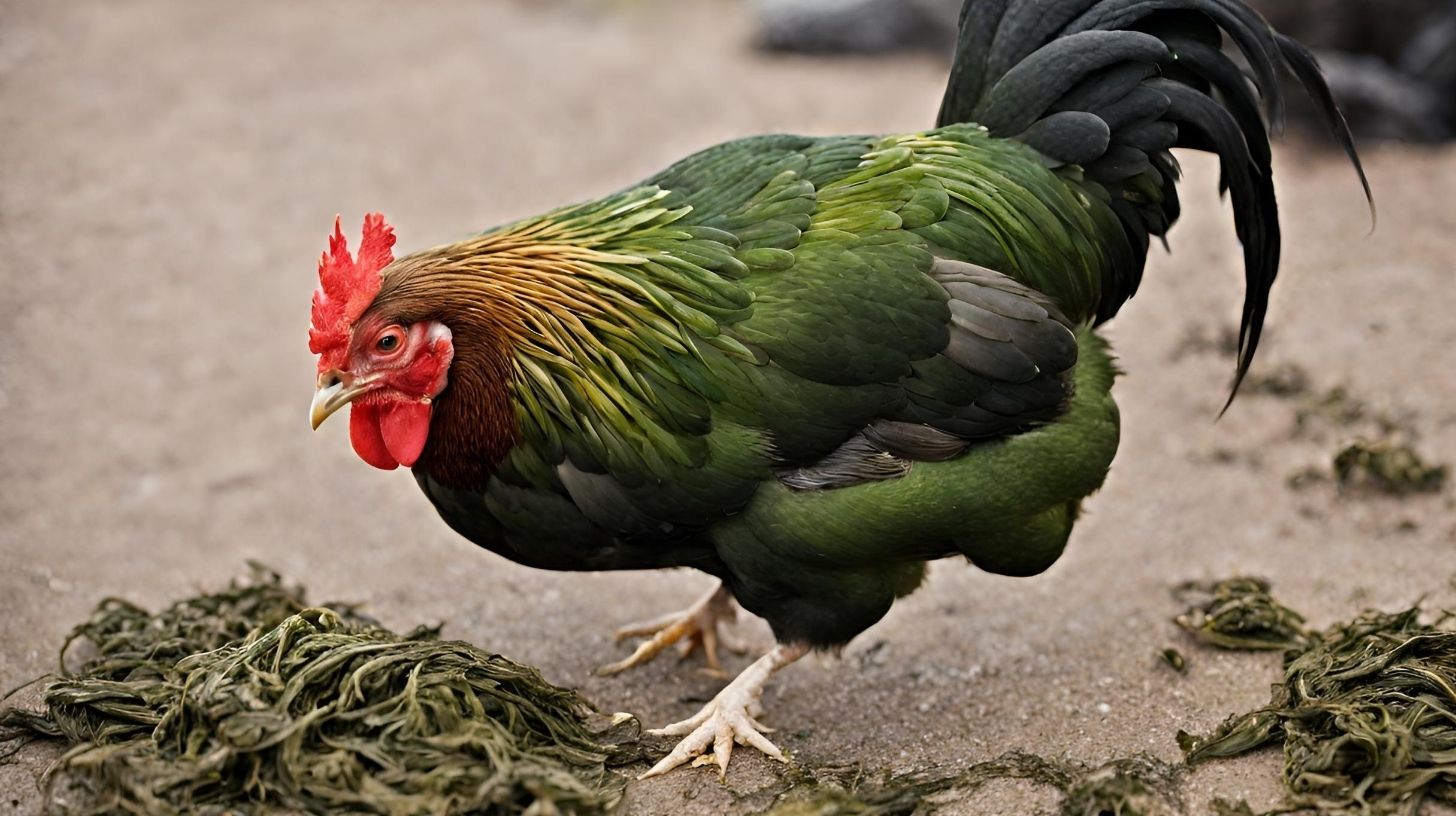 Benefits of Seaweed for Chickens
Benefits of Seaweed for Chickens
Seaweed offers a wide array of key nutrients, vitamins and minerals that are great supplements for a chicken’s diet. Here are some of the top benefits:
- Protein: Seaweed contains all essential amino acids and has higher protein levels than most land-based vegetables. The protein helps chickens develop strong muscles and feathers.
- Omega-3 fatty acids: Omega-3s found abundantly in seaweed support a healthy immune system and brain development. Omega-3 enriched eggs are also popular with consumers.
- Vitamins: Seaweed contains Vitamin A for immune function, Vitamin C for collagen formation, B Vitamins for energy metabolism and Vitamin E for antioxidant protection.
- Minerals: Iodine, iron, calcium, phosphorus, magnesium, zinc and manganese in seaweed supports bone health, red blood cell formation and enzyme functions.
- Fiber: The fibrous cell structure of seaweed aids digestion and gut health. Soluble fiber feeds healthy gut bacteria.
- Carotenoids: Seaweed contains lutein and zeaxanthin that promotes eye and skin health. The yellow/red pigments also enhance egg yolk color.
- Antioxidants: Unique marine antioxidants, like fucoidan, fight cellular damage from free radicals and environmental stressors.
- Foraging enrichment: Dried or fresh seaweed provides environmental enrichment. Pecking at seaweed satisfies natural foraging instincts.
With this stellar nutrition profile, it’s clear why seaweed makes an excellent supplemental feed. Even small, occasional portions pack a big nutritional punch.
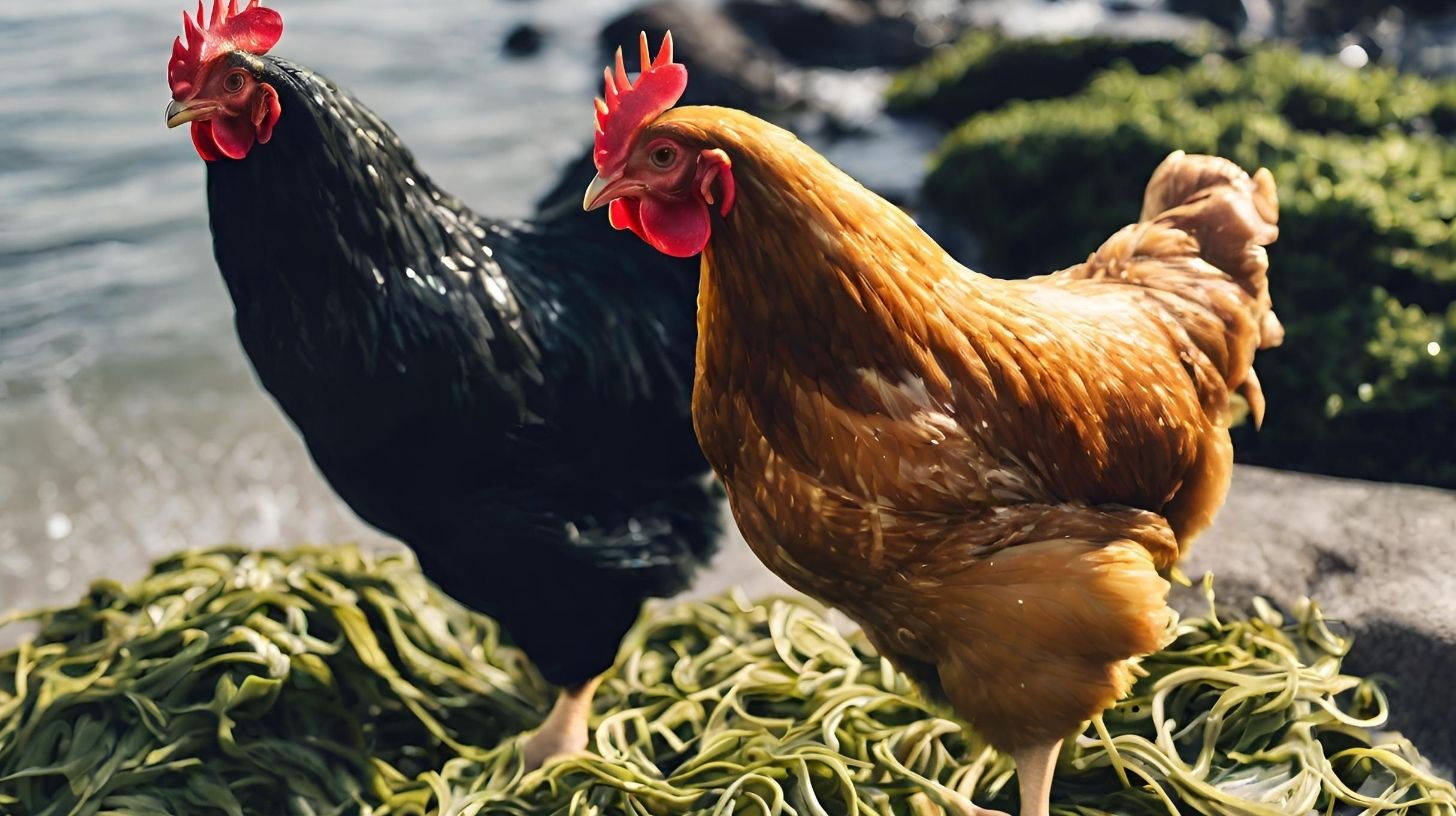 Best Practices for Feeding Chickens Seaweed
Best Practices for Feeding Chickens Seaweed
Seaweed offers fantastic benefits, but should be fed in moderation. Follow these best practices for safely incorporating seaweed into your chickens’ diet:
- Moderation: Feed dried or fresh seaweed only 1-2 times per week at most. A portion should not exceed 10% of their total feed.
- Variety: Rotate 3-5 different types of edible seaweed. This prevents overconsumption of any single mineral while providing diverse nutrients.
- Rinse thoroughly: Fresh seaweed especially should be rinsed of any sand, salt and potential ocean contaminants. Soak in fresh water for 15-30 minutes.
- Dry completely: Chickens cannot digest soggy, wet seaweed. Allow fresh seaweed to dry for 12-24 hours before feeding.
- Small pieces: Cut or shred large seaweed sheets into smaller 1-2 inch pieces the chickens can easily consume.
- Supervise: Provide seaweed by scattering on the ground or placing inside a chicken feeder. Supervise feeding to prevent choking risks.
- Slow start: Introduce seaweed slowly. Allow young chickens and chicks time to get accustomed to this new feed.
Following this balanced approach allows chickens to safely enjoy seaweed’s nutritional perks. Monitor their health for any potential issues. Discontinue use if any adverse effects arise.
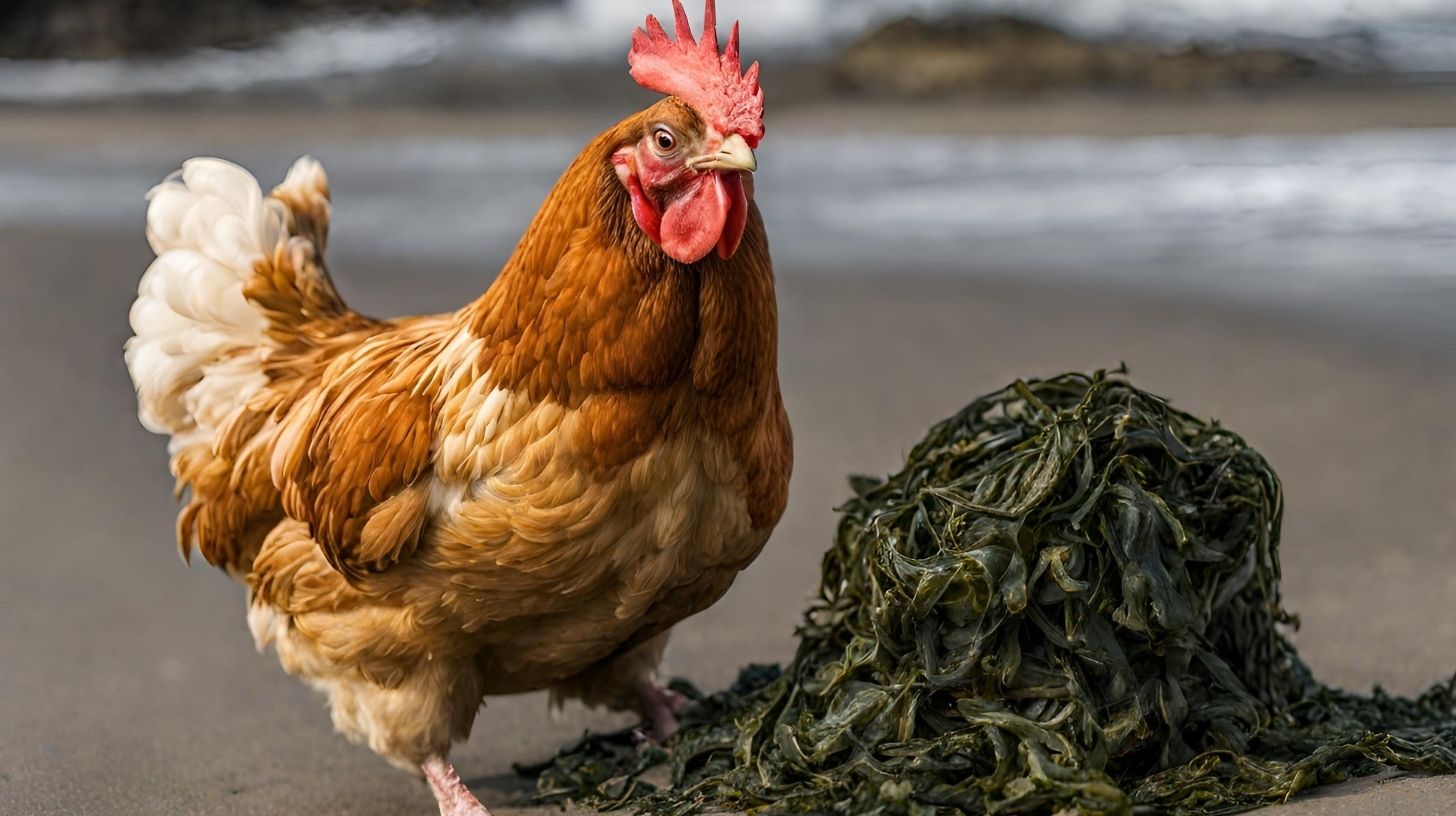 Best Seaweed Varieties for Chickens
Best Seaweed Varieties for Chickens
With thousands of different seaweed species growing in the ocean, it is crucial to identify the chicken-safe varieties. These types of seaweed are generally considered safe and nutritious for chickens:
- Kelp – This nutrient powerhouse should be the base seaweed in any chicken diet. Choose bull kelp, giant kelp, or kombu kelp.
- Nori – Popular edible seaweed sheet used in sushi rolls. Brimming with protein, iodine, vitamins and antioxidants.
- Dulse – Soft red seaweed rich in iron, potassium, magnesium, Vitamin K and B-vitamins. Try dulse flakes.
- Sea Lettuce – Bright green sea lettuce provides carotenoids, Vitamin K, iron and omega-3s. Rinse thoroughly to remove any clinging sediment.
- Irish Moss – Abundant in antioxidants, magnesium, potassium and selenium. Look for Irish moss flakes.
There are many other potential varieties, like bladderwrack and alaria. Always research variety safety before feeding unfamiliar seaweed to chickens. Some seaweeds pose serious risks as outlined below.
Dangers of Feeding Chickens Certain Seaweed
While beneficial in moderation, there are some very real risks associated with feeding chickens the wrong types of seaweed. Do not feed chickens the following:
- Toxic varieties: Certain red algae species contain toxins harmful to chickens, pets and humans, including channelled wrack, Neptune’s necklace and Lomentaria hakodatensis. Research before feeding.
- Raw seaweed from polluted waters: Seaweed absorbing toxins like heavy metals, chemicals or sewage runoff can poison chickens. Only harvest seaweed from unpolluted waters.
- Overconsumption of nitrates: Some seaweeds have naturally high nitrate levels. Overconsumption can cause nitrate poisoning with symptoms like tremors, diarrhea, breathing issues, and potentially death.
- Excess iodine intake: The high iodine in seaweed, especially kelp, can negatively impact thyroid function and egg laying capabilities if overfed. Introduce kelp slowly and limit total intake.
- Spoiled seaweed: Fresh seaweed left unsanitized, wet, or unrefrigerated can harbor bacteria like E. coli and accumulate histamines from spoilage. Cook or dry fresh seaweed thoroughly before feeding.
While seaweed provides amazing benefits, it also deserves your caution. Follow the safety guidelines outlined in this article to minimize any risks. Immediately remove seaweed from feed if any concerning symptoms arise after consumption.
Frequently Asked Questions About Feeding Chickens Seaweed
Here are answers to some common questions about feeding chickens different types of seaweed:
Can chickens eat dried seaweed sheets?
Yes, dried seaweed like nori is perfectly safe for chickens when chopped into smaller pieces. It provides a healthy dose of essential nutrients.
What minerals are in seaweed for chickens?
Iodine, iron, magnesium, calcium, selenium, manganese, zinc, phosphorus, and potassium are abundant minerals vital for chicken health and egg production.
Is seaweed high in iodine for chickens?
Yes, seaweed is one of the richest sources of iodine. But too much iodine can negatively affect laying hens. Use kelp sparingly and monitor thyroid impacts.
Do chickens like the taste of seaweed?
Most chickens love pecking at the salty, savory flavor of dried or fresh seaweeds. It captures their natural foraging instincts.
What are the benefits of seaweed for chickens?
The top benefits are protein, omega-3s, fiber, antioxidants, essential vitamins, and readily absorbed trace minerals that boost chicken health.
Is seaweed safe for baby chicks?
In small amounts, seaweed is safe for chicks after their initial week when provided it in tiny pieces. Best to wait until fully feathered at 4-6 weeks old.
Can too much seaweed be bad for chickens?
Yes, overconsumption of seaweed can cause excessive iodine intake, nitrate poisoning, vitamin/mineral imbalances or other toxicity issues. Always feed in moderation.
Conclusion
When fed responsibly, seaweed makes an excellent supplemental feed that benefits chicken health, egg nutritional profiles, meat quality and foraging enrichment. Just be mindful of feeding frequency, portion size, drying requirements and avoiding toxic varieties. With the right approach, seaweed is a nutritious treat chickens love.
Welcome. I’m Adreena Shanum, the proud owner of this website, and I am incredibly passionate about animals, especially poultry. I founded adreenapets.com as a labor of love, stemming from my desire to share my knowledge and experiences with poultry enthusiasts worldwide.



